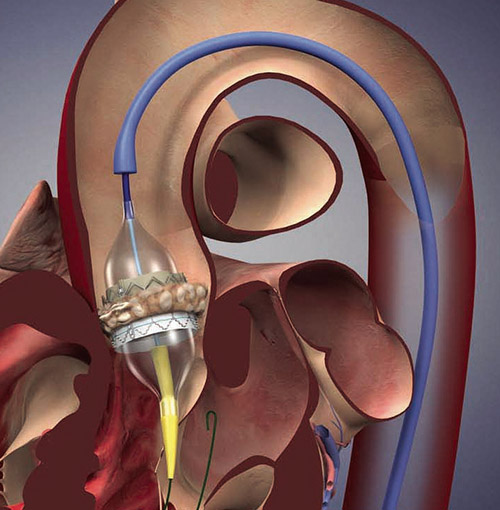
(Courtesy of RWJ Barnabas Hospital) What saps vitality after age 75? One thing, in many cases, is a condition called aortic valve stenosis—a narrowing of the valve that connects the left ventricle to the aorta, the body’s largest artery, often caused by the gradual buildup of calcium. The traditional treatment is open heart surgery to replace the valve. But there’s a catch-22: For many seniors, the aging process that has caused the problem has also caused other conditions that rule these patients out as safe candidates for such a major operation.
Enter TAVR (pronounced TA-ver)—transcatheter aortic valve replacement—a procedure that since 2011 has been bringing dramatic relief to thousands of seniors, permitting them to enjoy a healthier, livelier life. And thanks to research at Saint Barnabas Medical Center and across the nation, this procedure, available at the medical center, will soon be an option for many more individuals. Specialists at the medical center already provide more patients with this type of valve replacement than any other center in the state.
The TAVR procedure involves threading a thin tube, the catheter, from an artery in the groin up to the heart. Using tiny tools and specialized techniques, the physician collapses, or folds, an artificial replacement valve so that it is very small, secures it to the tip of the catheter, then threads it up to the heart in the precise area of the faulty valve, and then expands the new valve.
“Aortic valve stenosis is one of the most common of all heart valve problems, affecting as many as one in 10 people over 65 years old,” says Mark J. Russo, M.D., an expert on heart valve disease and a cardiac surgeon at Saint Barnabas Medical Center. “As the condition progresses it causes people to feel short of breath and fatigued, and in more advanced cases it can lead to sudden death.”
“Surgical aortic valve replacement for aortic stenosis is one of the best surgical procedures that I have to offer patients as a cardiac surgeon, but now for most patients TAVR has proven to be even better,” Dr. Russo says. “Compared with open heart surgery, recovery after TAVR is much quicker. Instead of spending five to 10 days in the hospital, most of our TAVR patients spend just one night. In fact, many patients say they feel better immediately.”
Initially, TAVR was the preferred treatment for older and for sicker patients—those who were poor candidates for the more invasive open heart surgery. However, Dr. Russo and his colleagues at Saint Barnabas Medical Center have taken a leading role nationally in examining the use of TAVR in a broader range of patients. These include lower-risk and younger patients, as well as patients with bicuspid aortic valves, a common irregularity of aortic-valve anatomy. In these populations, open heart surgery was previously the preferred treatment.
In most patient populations, TAVR has been proven in recent studies to be associated with increased survival, decreased risk of stroke and improved quality of life compared with traditional open heart surgery. “Our center has been fortunate to play a leading role in this work,” says Dr. Russo.
“For the first time, heart surgeons and interventional cardiologists are collaborating as a heart team to perform these lifesaving procedures,” says Bruce J. Haik, M.D., system director of Cardiac Catheterization Labs for RWJBarnabas Health. “The skill sets required in our respective cardiovascular specialties are invaluable when assessing a patient’s risks and benefits before, during and after the TAVR procedure. Most of our ‘best in class’ outcomes are a result of this heart team approach.”
Dr. Russo, Dr. Haik and their team continue to be part of important national research studies exploring better treatment options for aortic valve stenosis.
“Until now, we have waited to correct this condition until after patients suffer symptoms,” says Dr. Russo. “However, even before symptoms manifest, patient may suffer irreversible damage to the heart or even be at risk for sudden cardiac death. Given the lower risk associated with the TAVR procedure, there is now increasing evidence that it is better to replace the valve before the patient experiences symptoms.”
For more information about TAVR or to make an appointment with one of New Jersey’s top cardiac specialists, visit rwjbh.org/tavr or call 973.322.9440.













